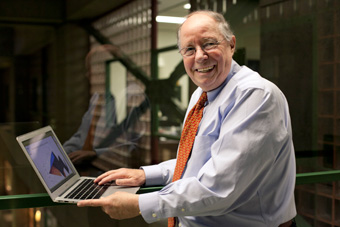Our leaders in e-learning

Faced with yet another classroom of students using their cell phones to Tweet or Facebook-chat, Jeanette Novakovich decided against a punitive response. Instead, the assistant professor in the Department of English opted to work these social media tools into her teaching. "I figured, they want to write? I'll let them write in the way they want on the sites where they want to write," says Novakovich. "The impulse to write using these new tools comes from the students so the practice engages them in a way few lectures could."
Novakovich will be one of a handful of Concordia professors participating in a panel discussion and showcase on how to incorporate social media into course design at the upcoming conference titled e.SCAPE: Knowledge, Teaching, Technology, on April 3, 4 and 5 on the Sir George Williams Campus.

Fred Szabo is among the dozens of Concordia professors sharing his experiences at the conference. The professor in the Department of Mathematics and Statistics has more than 20 years experience with online teaching and learning. “Technology makes routine computations a breeze," says Szabo. "But online learning also allows my students to turn to the lecture material when they want, as often as they want."
Szabo sees other benefits to online learning, believing it enables greater collaboration between students and frees up class time for greater face-to-face discussion and exploration of material.
At e.SCAPE, he’ll deliver two presentations. One is a workshop on how to add interactivity to online courses; the other shows how to use Moodle to manage and improve teaching and learning experiences.
Course design will be the focus of another workshop at e.SCAPE featuring two Concordians. Joanne Locke, associate-dean, academic programs in the Faculty of Arts and Science, and Anne Wade, manager and information specialist in the Centre for the Study of Learning and Performance, created an online version of Introduction to Library Research Practices, a course that develops information-literacy skills. The original course, first developed more than 20 years ago, has evolved to teach fundamental research skills to undergraduates throughout the university. A year ago, Locke and Wade collaboratively developed the online version of the course.
“Taking the course online opened up information literacy to students looking for greater flexibility in their schedules,” says Wade. “Now, the course content can be delivered in a consistent fashion to students wherever they may be.”

Locke also points out, "Students today are increasingly dependent on web-based resources and online search engines for their research. This shift to teaching online allows students a greater opportunity to sift through these resources, evaluate them, and participate more actively in demonstrations of search applications."
Some professors worry that keeping up with emerging technologies poses a considerable challenge. Yet, it's a challenge many have answered through creativity and innovation. Professors who have integrated technology into their teaching also note that, although not every course can be taught effectively online and not every student learns best that way, they see the merits in these advances to teaching and learning.
Many students do, too. In the past two years, registration in online courses at Concordia has risen steadily to 11,973 students during fall 2012, compared with 10,921 a year before, and 13,042 this winter, compared with 11,945 in the 2012 winter term. In surveys regarding their satisfaction with the course material, the way it was delivered and the opportunity for interaction with faculty and teaching assistants, 75 per cent of students indicated they are satisfied or very satisfied.
Research is being done by Concordia faculty to identify the conditions most favourable to enhancing educational experience through integrating technology. Novakovich, for example, has gone beyond using Twitter and Facebook as writing tools to study the impact multimedia narrative strategies and blogging have had on students’ writing skills. Her research showing blogging’s positive impact on the quality of their writing was recently accepted for publication in the Journal of Educational Technology and Society. Novakovich is currently pursuing a PhD at Concordia in education with a specialization in Educational Technology.
The e.SCAPE conference is designed to support Concordia's Academic Plan. The plan's three main priorities for the 2012-13 academic year are innovative and dynamic undergraduate offerings, graduate student recruitment, and investments in the libraries.
e.SCAPE is scheduled Wednesday, April 3, through Friday, April 5, from 9 a.m. to 5:15 p.m. Keynote addresses are scheduled daily at noon. The conference is open to the entire Concordia community: students, staff and faculty. No advance registration is required; admission to sessions is on a first-come, first-served basis.
Related links:
• e.SCAPE
• “e.SCAPE conference: innovation central” — NOW, March 4, 2013
• “Meet top brains @ e.SCAPE conference” — NOW, February 27, 2013
• “E-learning: New pathways in education” — NOW, February 20, 2013

